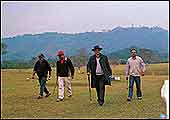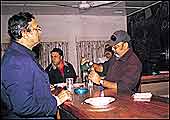|
They
lived like kings. Their charming corrugated tin-roof bungalows were
the castles, from which they ruled over the vast estates that surrounded
them. Their subjects were thousands of workers and their families
who derived livelihoods from the tea gardens.
Tea planters, literally, lived like the Lord
of Tartary. Dozens waited on them, serving their every need, as
they went about their jobs in the remote regions of Assam, North
Bengal, and the Nilgiris. They bowed only before their superiors
in the pecking order and to the boxwallahs who sat in Kolkata and
London.
''Gardens were like small jagirs,'' recalls
Pavan Kaul, the current burra sahib of Bogapani Tea Estate in Assam's
Tinsukia district. ''Till the seventies, the garden manager was
God. He was often called upon to attend to problems in the estate,
settle domestic and private disputes involving his workers, judge
a flower show and meet his European buyers, all in the course of
a single day. And it was par for the course for him to then drive
70-80 km to the local planters' club for an evening of drinking
and merriment.''
The burra sahib, as the garden manager is called,
still does a lot of this, but the general consensus is that the
quality of his life isn't the same any more. ''That lifestyle is
no longer in tune with the times,'' says Rajeev Takru, Senior Vice
President, Eveready Industries. In the old days, there would be
a servant just to help the manager get into and out of his shoes!!!
''You can't lead a life like that in today's day and age. It had
to change. And once the older generation of planters retire, this
lifestyle will pass into history,'' he adds.
There are several reasons for this. ''Today's
young planter considers this to be just another job, like any other.
For us, it was a lifestyle,'' says Kaul. The prolonged slump in
the tea industry hasn't helped. The loss of the protected Russian
market, the rise in production costs and competition from Sri Lankan,
Kenyan, and Chinese teas in the world market have all contributed
to the downturn. The inevitable reaction to this has been cost cutting.
''Indian owners, who took over the gardens
when the British left, were always uncomfortable with the lifestyles
of their garden managers,'' says B.P. Tantia, managing director
of Jamirah Tea Co Ltd. ''They now began to withdraw several facilities
and perquisites that these managers enjoyed.'' This meant a reduction
in the number of personal servants from 15-20 per manager to a more
egalitarian six to eight. Other perquisites like clubs and housing
were also pruned.
A DAY IN THE LIFE OF A PLANTER
Pavan Kaul's routine is typical of most
planters. Here's a brief snapshot of what he does with his time. |
 6.00
AM: Pavan Kaul reaches field office. Checks out the
programme for the day, goes through the day's work chart and
details the work that he wants done. This takes meticulous planning,
as Bogapani covers an area of about 1,100 hectares, has some
7.2 million bushes and employs around 2,700 workers. 6.00
AM: Pavan Kaul reaches field office. Checks out the
programme for the day, goes through the day's work chart and
details the work that he wants done. This takes meticulous planning,
as Bogapani covers an area of about 1,100 hectares, has some
7.2 million bushes and employs around 2,700 workers.
7.00 AM: He goes to
the main office for routine administrative chores
7.30 AM: Visits the
factory just behind his office to check on the produce of
the previous night and to taste the teas that have been manufactured.
8.00 AM: Goes into the
garden in his open Gypsy to supervise the plucking and spraying
operations. Driving slowly, sometimes communicating with his
field office on a walkie talkie, it takes him about an hour
to complete a round of the estate.
9.00 AM: Returns home
for chhota hazri breakfast in the jali ghar (a broad balcony
enclosed by a mosquito net) at the burra bungalow with his
wife.
9.30 AM: Back in the
field, driving around the garden in his Gypsy.
12.00 NOON: Returns
to main office to check the registers, sign routine orders
and correspondence.
1.00 PM: Back home for
lunch with his wife and short siesta.
2.30 PM: Rounds of the
field, office, and factory.
5.00 PM: Main office.
Reviews the day's performance and plans ahead.
7.00 PM: Returns home.
Teas are best manufactured in a cool climate. So the manufacturing
process starts at midnight. The burra sahib remains on call
through the night and sometimes even pays surprise visits
to check that everything is ship shape and in order.
|
As a result, the awe a burra bungalow inspired
was considerably diffused. And this, in turn, diminished the aura
and authority of the planter, explains Kaul. ''The planter was the
big guy around. The glamourous life, the servants, the burra bungalow
and the rituals associated with hunting-fishing-club life gave him
a larger-than-life image among the workers. And this allowed him
to command their undivided loyalty." Left unspoken is the fact
that the burra sahib's standard of living has fallen, without any
commensurate compensatory factor to balance it. Kaul, however, is
quick to add that a few former agency houses still look after their
managers well.
Given the decline in standards, it isn't surprising
that the industry no longer attracts the best talent. ''The comparative
pay is no longer attractive,'' says A. Monem, Senior Vice President,
Eveready Industries. ''And given the consumer boom and rising aspiration
levels, a young manager would prefer cash to a grand company bungalow
with 15 servants.''
Typically, planters were alumnus of public
schools, fond of outdoor life and came from ''good backgrounds''.
This last was a euphemism for a royal lineage or a planter family.
''Labour looked up to them and they fitted in very easily to life
on the estates,'' says Kaul. "A planter was basically a gentleman
farmer. And you don't have to be an Einstein to manage a farm,''
adds Takru. This set was also comfortable working with the Scotsmen
who, till then, made up the bulk of the planters. They picked up
the habits and rituals of their expat bosses and continue to take
pride in them. This is what gives the tea industry its unique Raj
era flavour.
But the social profile of young planters is
now changing. The emergence of other well-paying sectors, the diminishing
glamour of a planter's job and insurgency-related security problems
have combined to take away some of the sheen of garden life.
According to sources, there is also political
pressure to recruit locals as garden managers. This has resulted,
in some cases, in a fall in the quality of recruits. And the poor
quality of new recruits leads to a further fall in standards that,
in turn, scares away other recruits.
Technology and the march of the cable-satellite
TV revolution has also played a part in the overall decline of garden
life. The club, which was the hub of social life in the gardens,
is fighting a losing battle with television. ''Young assistant managers
sometimes skip club days in order to catch their favourite movie
or serial on TV," says Ranvijay Singh, the burra sahib of Behora
Tea Estate in Assam's Golaghat district, and a scion of the royal
family of Jodhpur. ''This would have been unthinkable when we started
out.''
|

|
|
TEEING OFF: Kaul (centre)
with friends at Margherita Club's nine-hole golf course
|
 |
| CHEERS!: Margherita Tea Estate's
Anand Wats (right) at the club's bar |
 |
| GENTEEL LIFE: The burra
sahibs and their families at a dinner hosted by Kaul |
Security fears have put paid to nightlong drinking
binges and 200 km drives to attend parties. Club days are held mid-week.
At the Margherita Club, which serves about eight to nine gardens
in an eponymous town in the north-eastern tip of India, a member
usually hosts high tea on Wednesdays for all the burra sahibs of
the member gardens, their assistants, and their families.
''This is something we try not to miss,"
says Anand Wats, manager of the Margherita Tea Estate, and a regular
behind the bar.
"Sports is very important for a planter,"
says Takru, "and several managers entered the profession on
the strength of their prowess in tennis, squash, polo, golf, and
shikar." Polo and shikar, of course, are now history but the
other games are still quite popular. "On Sundays, the two most
populated areas of the Margherita Club are the nine-hole golf course
and the bar," says Wats.
Amidst all this talk of lifestyles and burra
sahibs and their elaborate chhota hazris, it is often forgotten
that a planter's life is quite hard. (See A Day In The Life Of A
Planter). He works an average of 12-13 hours on a regular day and
remains on call 24 hours a day.
"If a labourer's wife develops labour
pain at midnight, it's my responsibility to ensure that she gets
proper medical care," says Kaul. Bogapani, like many large
estates, has a well-equipped hospital with two doctors in attendance
but "we sometimes have to refer cases to the main hospital",
which is some distance away, he adds.
"And don't forget that summer temperatures
in Assam and parts of the Dooars can touch 40-42 degrees Celsius...
and you can get up to 12 inches of rain in an hour," says Tantia.
"...and a planter spends most of his day out in the open."
Then again, there's little social life on non-club days and very
little for wives to do. "I read about five books a week, tend
to my garden and do most of things that planter's wives usually
do," says Vidya Kaul, burra memsa'ab of Bogapani, and a member
of the royal clan of Travancore. "But not every young girl
who marries a planter likes it here. There's nothing much here for
an ambitious, qualified young woman."
"Enter wife, exit planter. End of Act
I, Scene I," says Takru with a touch of Shakespearean drama.
"Seriously speaking, many planters prefer to take up city jobs
because of family commitments. The absence of job opportunities
for wives is an important determinant of choice." Equally important
is schooling. "There aren't very many good schools here, at
least none where your child can be a day scholar," says Vidya
Kaul, whose two daughters studied at Mayo College, Ajmer. "So
a planter, perforce, has to send his children away to boarding schools.
Many young parents aren't willing to do that nowadays."
But despite the drawbacks, garden life, in
many ways, remains the last bastion of gentility in this country.
Vidya Kaul is aware that her lifestyle is standing at the cusp of
history. Another few years and it will be gone for good. But she's
not mourning. "It's inevitable given the pace of life in general,"
she says without a trace of emotion. "It's happening all over
the world. So why should it be different in India? You can't really
turn the clock back, can you?"
It's true. You can't. But as times pass...
and times change... it is perhaps time to pause and ponder over
the passing of an era-of overwhelming hospitality, of genteel graciousness,
and of a breed of men and women who worked hard, partied harder
and lived their lives to the fullest.
|
